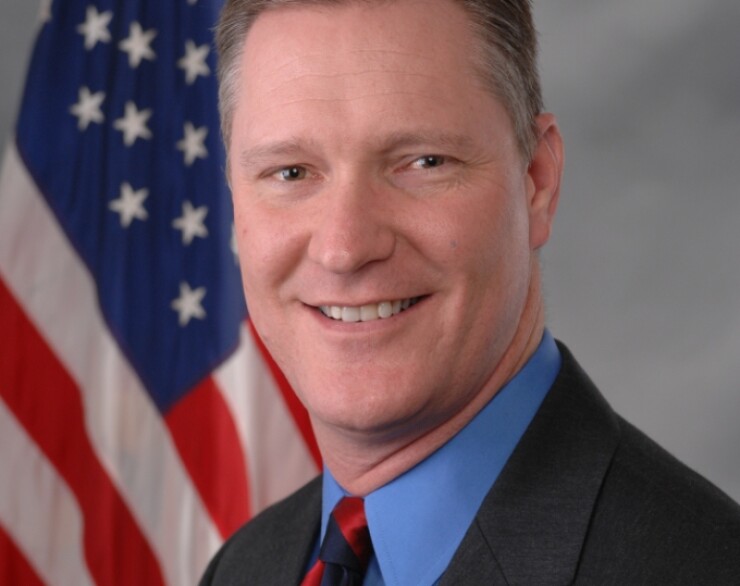Reinstatement of advance refundings could be a relatively low-cost addition to the $3 trillion House-passed HEROES Act as congressional Democrats negotiate changes with Senate Republicans and the Trump administration, according to a leading Republican on the House Municipal Finance Caucus.
A bipartisan bill will cost less than $2 trillion, Rep. Steve Stivers, R-Ohio, the co-chair of the panel said during a Government Finance Officers Association video roundtable Monday.
“It will have to be negotiated if we want something to happen,” said Stivers, who added, the House-passed bill “was prepared in Speaker [Nancy] Pelosi’s office” without Republican input.

Stivers said if the amount of federal aid is reduced, advance refunding would be “an inexpensive way to allow municipalities to refinance their debt.” He also said the 500,000 population cutoff for municipal aid in the earlier CARES Act was a “very arbitrary cutoff,” suggesting it could be lowered.
The HEROES Act passed by the House Friday, offers $915 billion in direct federal aid to state and local governments, including tribes and territories.
The bill proposes $500 billion in direct funding to state governments to address the fiscal impacts from the public health emergency as well as $375 billion for local governments, $20 billion for tribal governments and $20 billion for territories, such as Puerto Rico.
While passage in the Senate was not expected at those levels, support is building for a smaller package of $500 billion in state and local aid.
Two additional Senate Republicans have joined Louisiana Sen. Bill Cassidy and several Democrats as cosponsors of a bill that would provide $500 billion to states and local governments to cover increased COVID-19-related costs and revenue shortfalls.
Republicans Cindy Hyde-Smith of Mississippi and Susan Collins of Maine along with Democrats Joe Manchin of West Virginia and Cory Booker of New Jersey have joined the lead sponsors Cassidy and Democrat Robert Menendez as original cosponsors.
The Menendez-Cassidy bill would allocate one-sixth of each state’s funding to counties and another sixth to municipalities for a combined total of one-third of their state’s allocation, based on each of the three tranches of the formula.
The House version of the bill also has bipartisan support with lead sponsors Reps. Mikie Sherrill, D-N.J., and Peter King, R-N.Y., joined by Democratic Reps. Josh Gottheimer of New Jersey, Tom O’Halleran of Arizona, Ted Lieu of California, and Debbie Dingell of Michigan as well as Republican Reps. Tom Reed and Elise Stefanik of New York, Fred Upton of Michigan, and Brian Fitzpatrick of Pennsylvania.
Cassidy, in a videotaped interview shown at the conference, called the $500 billion SMART Fund money that would preserve “the thin blue line bill.” The city of Shreveport, which is not nearly the size of New Orleans, has eliminated 54 police officer positions because of recent revenue shortfalls, Cassidy said.
“Who is going to open up a store if they don’t think it’s safe?” Cassidy asked. How can a restaurant operate if the garbage won’t be picked up?
Menendez, who appeared live on the GFOA video conference, also said the SMART Fund would allow federal grants to go to municipalities of under 50,000 population.
The HEROES Act takes a different approach. The $375 billion for local governments would be equally split between cities and counties based on their populations over two years.
The $187.5 billion “municipality fund” would use a modified Community Development Block Grant formula with 70% going to cities and towns with a population of over 50,000 and the remaining 30% to municipalities under 50,000.
The $187.5 billion county fund would go directly to counties based on their population.
Seven Senate Democrats are sponsoring a bill that would establish the same distribution formula for counties and municipal governments if the Senate eventually approves aid for counties and local governments.
The bill, S. 3632, is authored by Sen. Kirsten Gillibrand of New York with co-sponsors Sens. Chuck Schumer of New York, Doug Jones of Alabama, Joe Manchin of West Virginia, Sherrod Brown of Ohio, Michael Bennet of Colorado, and Gary Peters of Michigan.
The HEROES Act also provides for a one-year increase of 14% in the Federal Medical Assistance Percentage (FMAP) starting July 1.
Medicaid is the largest budget item for many state governments and they would receive most of the benefits from the increase. The bill also would provide a one-year increase of 10% for Medicaid’s home- and community-based services (HCBS) benefit.
The bill also calls for the District of Columbia to receive $755 million from the CARES Act Coronavirus Relief Fund, which had treated D.C. as if it were a territory.
Also in the HEROES Act, there’s $15 billion for transportation through grants to states, tribal governments and territories. State DOTs would receive $14.775 billion by formula under the Surface Transportation Block Grant Program, with those funds allowed to cover operational, maintenance, and administrative expenses, including payroll needs. Tribal DOTs would receive $150 million, Puerto Rico $60 million, and other territorial DOTs would receive $15 million.
Another $15.75 billion would be spent on emergency transit relief to maintain basic transit services, with $11.75 billion distributed through formula aid and $4 billion through applications to the secretary of transportation.
Other provisions include $5 billion for Community Development Block Grants for coronavirus response and mitigation, $11.5 billion for Homeless Assistance Grants, $1.5 billion broadband funding for Wi-Fi hotspots and connected devices for students and library patrons, and $4 billion for emergency home connectivity needs.
Under the Federal Emergency Management Agency, there’s $1.3 billion for coronavirus response, including $200 million for the Emergency Food and Shelter Program; $500 million for Assistance to Firefighter Grants (AFG); $500 million for Staffing for Adequate Fire and Emergency Response (SAFER) grants; and $100 million for Emergency Management Performance Grants (EMPG).





